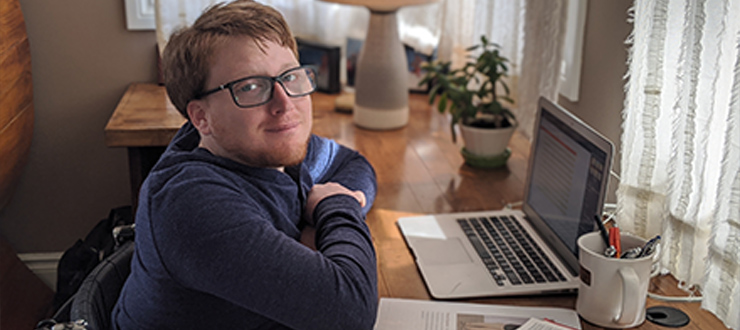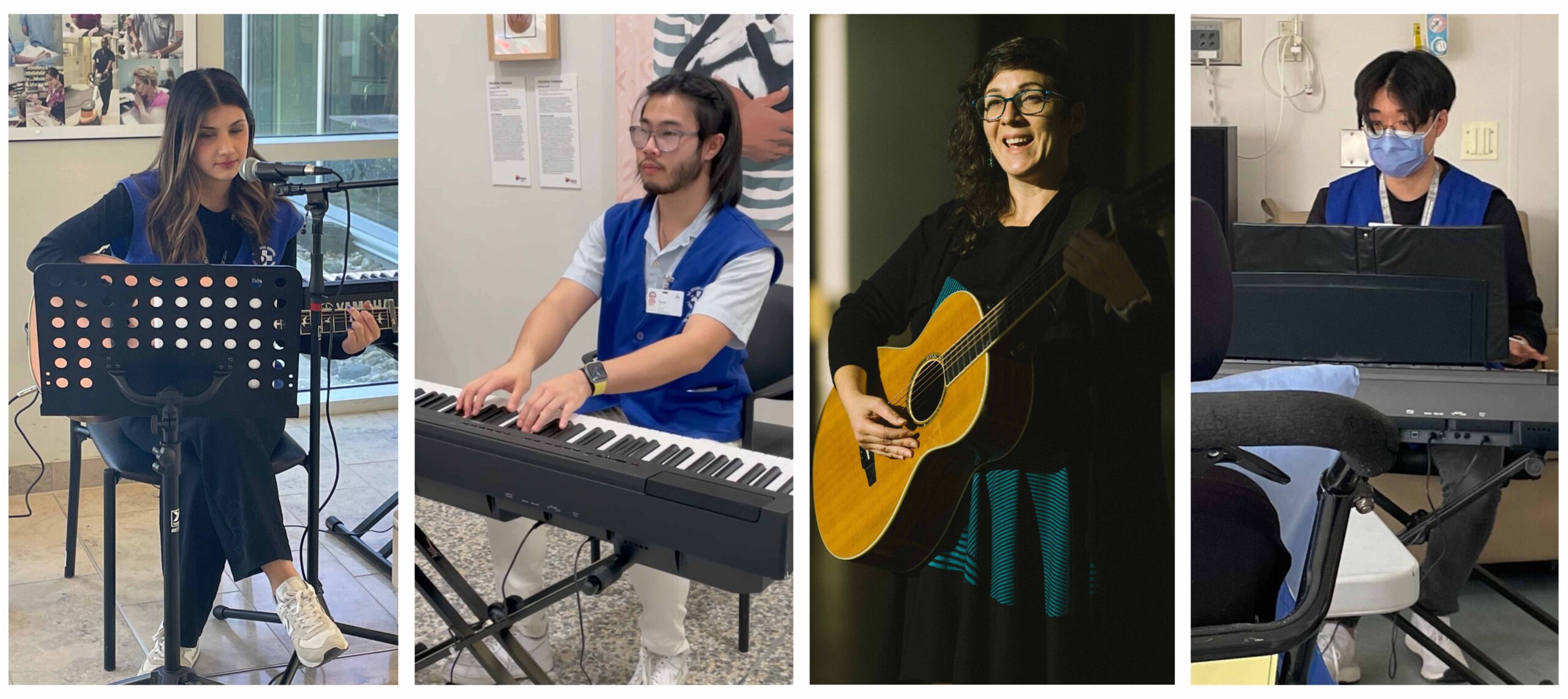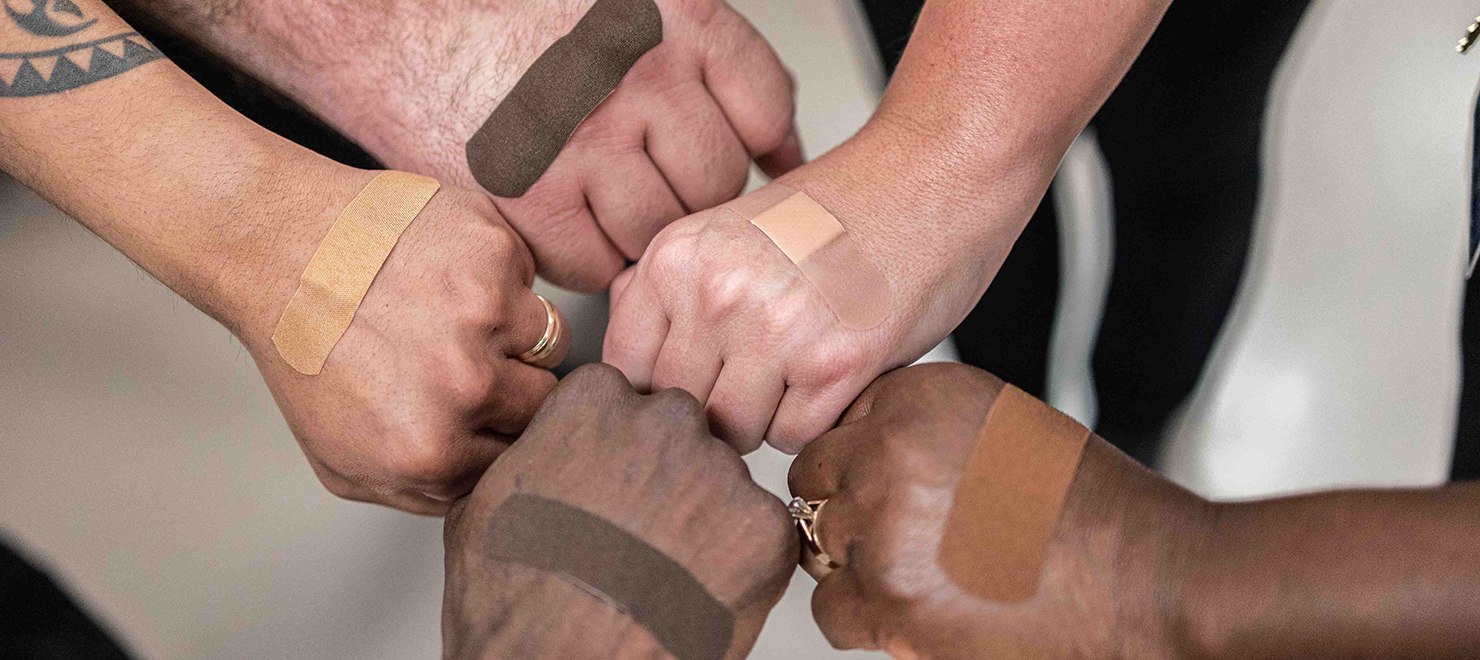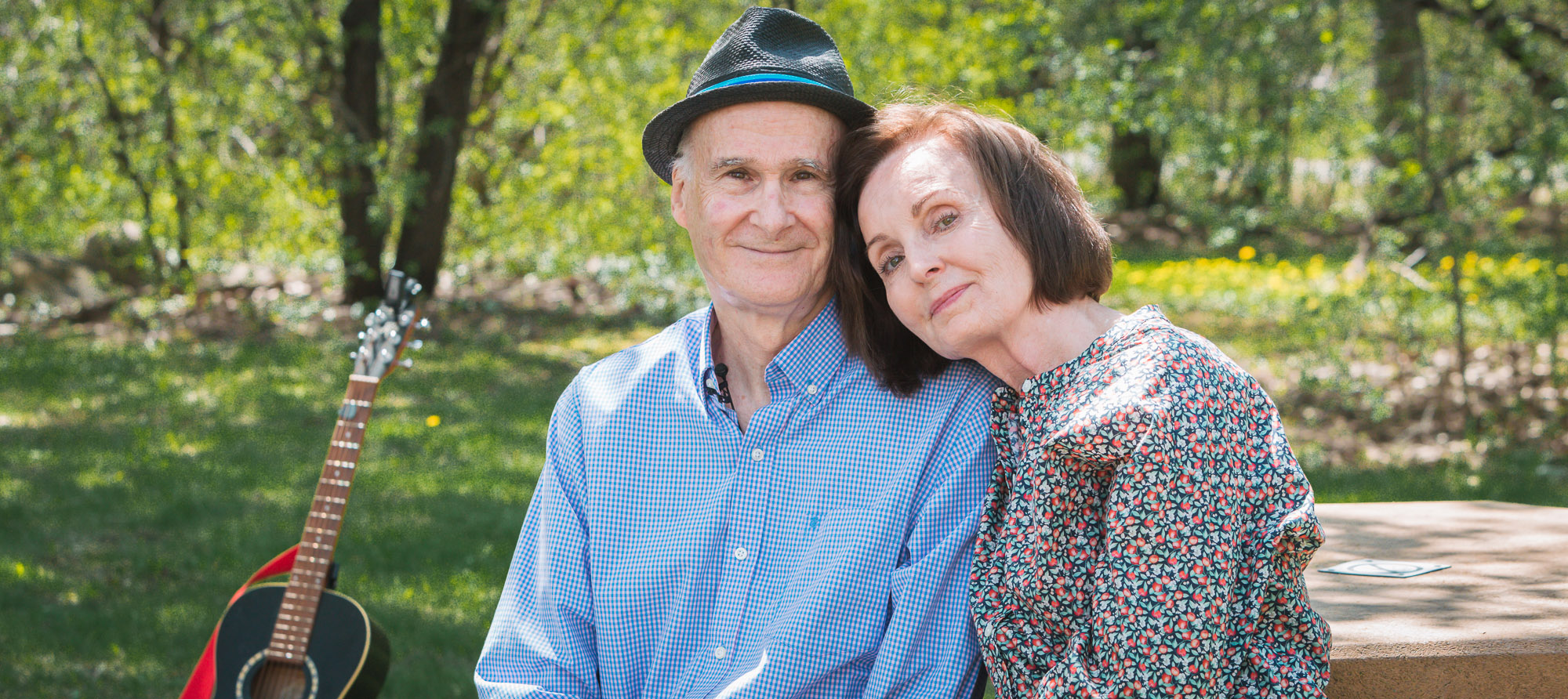
Virtual doctor appointments mean Harrison Brown can continue working from home during the COVID-19 pandemic and not have to travel to The Ottawa Hospital.
Harrison Brown relies on ParaTranspo to get to The Ottawa Hospital. He used to have to carve a three-hour window for a 15-minute appointment. But now, he has his doctor’s appointments at home—using his cell phone.
“It’s a game-changer for me,” said Harrison. The 27-year-old from Cornwall has spina bifida and has had to come to the hospital his whole life. When he moved to Ottawa, either his parents would come from Cornwall to drive him to the hospital or he’d take ParaTranspo. Not having to go to the hospital is “huge.”
The Ottawa Hospital normally has about 37,000 outpatient appointments every month. On March 17, The Ottawa Hospital and other hospitals in the area jointly announced that they were taking a planned approach to postpone non-urgent surgeries, procedures, outpatient programming and clinics in-line with guidance from the Ontario Ministry of Health.
With that plan now well in place, half of these non-urgent appointments are now being done virtually—right from the patient’s phone, tablet or computer. Not only is this more convenient for patients like Harrison, but it also means fewer patients overall have to come to the hospital during the COVID-19 pandemic.
“Most people have the technology. You only need a cell phone.”
Harrison’s urologist Dr. Duane Hickling got onboard with virtual care in early 2019. Many of his patients have mobility issues that make coming to the hospital a major event.
“I quickly came to realize most patients would benefit from it,” he said. “Most people have the technology. You only need a cell phone.”
In fact, Dr. Hickling now sees 95 percent of his patients on his computer screen.
“On a typical procedural day, I’d see 25 patients in the clinic; now it’s only one or two,” said Hickling. “Prior to the pandemic, I would estimate I did 25 percent of consults and follow-ups virtually. Now, almost all visits are done this way. I think that there is a much more widespread uptake of these virtual appointments because the efficiency is very high, and they provide more flexibility.”
“I love it,” said Harrison, as he explained how simple his virtual appointments are.
The hospital staff sets up the appointment, emails a link that he clicks at the appointed time, and then Dr. Hickling comes on the screen. The doctor can look at the test results on his or her screen and the patient can also see them at the same time. Harrison says the virtual appointment isn’t much different from an in-person one—only more convenient.
“We believe it’s the future of health care delivery.”
“I’ve done it on my computer and my phone. I’ve even done it on a break at work, which means I don’t have to take time off,” said Harrison.
Harrison is one of the thousands of patients who are now benefiting from years of collaboration between The Ottawa Hospital and The Ontario Telemedicine Network (OTN). OTN is the largest telemedicine network in Ontario and offers two-way videoconferencing access to care for patients. However, historically, patients still had to go to a health-care centre that was outfitted with specific technology.
Recently, The Ottawa Hospital and OTN partnered to pilot a more advanced virtual care program that allowed patients to use their own devices. The partnership helped the hospital accelerate its virtual care strategy, which focuses on improving the patient experience and improving access to health care.
The Ottawa Hospital further matured its implementation of virtual visits by linking private, secure video conferencing to the hospital’s Epic electronic health information system. On April 27, the hospital launched the Epic-Zoom video visit option for health-care providers. The Epic-Zoom virtual platform, has also allowed doctors to successfully involve trainees in virtual clinics. Patients can log into their MyChart account using any device equipped with a camera and microphone for a video chat with their provider from wherever they are—home, office, car, or on vacation.
“Our model of care will be forever positively changed as a result of virtual care innovations.”
“Virtual care means better access for patients, and more efficient care because patients don’t have to travel, pay for parking, or wait in a clinic room,” said Reece Bearnes, Clinical Director lead for virtual care innovation. “We believe it’s the future of health care delivery.”
Virtual care has become even more popular as a way to provide care during the COVID-19 pandemic.
“Building on the early success of our pilots, COVID-19 quickly accelerated us forward with our virtual care strategy,” said Bearnes, who noted the number of users doubled within two weeks. “We’re talking about thousands of patients a month now doing appointments virtually.
Virtual care appointments are ideal for follow ups, providing education, and supporting people with chronic conditions. People still go to the hospital for physical assessments, treatments and procedures, such as blood work or removing stitches.
“Our model of care will be forever positively changed as a result of virtual care innovations, and it is very much here to stay,” said Bearnes. “We will not be returning to the old way of doing things after this pandemic,. Providers are gaining experience, becoming efficient and finding this easy to do. Patients have now come to expect this as an option for their care and are holding us accountable to ensuring we can provide it.”
For Harrison, virtual care means his doctor’s appointment is just a phone call and won’t take up any more time in his day.

Support patient care and research at
The Ottawa Hospital
You might also like…
The place to be: The Ottawa Hospital recognized as one of Canada’s most admired corporate cultures
The Ottawa Hospital (TOH) has been named one of Canada’s most admired corporate cultures. Guided by compassion and commitment to patient care, TOH has developed a workplace culture that inspires confidence and trust in our employees, patients and family members.
Watch: Princess Margriet of the Netherlands sent us this lovely video message for the Civic’s 100th anniversary
If you’ve ever wondered why tulips are so important to our city, the answer involves a world war, a royal family and The Ottawa Hospital’s Civic Campus. In this special video message, Her Royal Highness Princess Margriet of the Netherlands shares why the tulip is a special symbol of the endearing friendship between her country and Canada.
A volunteer program that taps into the power of music
Studies have shown that music can benefit the body, mind, relationships and community. Musical Moments is a program where volunteers play live music to support positive outcomes for patients, visitors and staff.
We’ve got you covered: The Ottawa Hospital now offers bandages for a variety of skin tones
Whenever you’ve scraped your knee or had your blood drawn, odds are your bandage was the same colour every time. Peach has been the default hue for over a century — but no longer at The Ottawa Hospital.
Patient gifts a piece of home to Indigenous Cancer Program
Inuit patients can now see and hold a piece of their traditional territory in the Windòcàge Room at the General Campus, thanks to an interactive gift donated to The Ottawa Hospital by a cancer patient.
Second Chance: Don’s song for the people who saved his life
Making music has always been a big part of Don’s life, so when the staff and doctors at The Ottawa Hospital saved him from the brink of death, he could think of no better way to thank them.


 To reset, hold the Ctrl key, then press 0.
To reset, hold the Ctrl key, then press 0.





